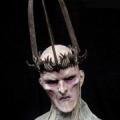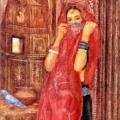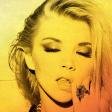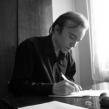-
Сообщений
1 219 -
Зарегистрирован
-
Посещение
Обновление статуса
Смотреть все обновления от Диотима с Безуминкой
-
White Darkness 2002 Richard Stanley
In The White Darkness Stanley follows a pregnant Manbo priestess, Edelle, and a sorceror, Altes Paul, on their journey to the holy mountain, the seat of the god Oguon Fera and a ritual site. Altes Paul’s story is fascinating. Having sold his soul to the devil and acquired life long prosperity, his powers have become legend in Haiti. His ‘death magic’ – an ability to kill – has made him notorious. Stanley is asked whether he requires Altes’ assistance. Edele practices white magic and like many other Haitians, sees the struggle to explain voudou as a historical struggle. Voudou is what makes the ‘past present’ for Haitians, who consider the current military occupation to be a continuation of previous political struggles.
Colonel Walker, who was then head of the occupying forces on the island, made this comparison to describe the position of the Americans: ‘The holy spirit cannot compromise with Satan, and essentially that’s what you do when you compromise with voudou.’ Ostensibly, the forces are there to control drug-trafficking, but the values underpinning their agenda are shown to be strikingly similar to that of the Christian missionaries working on the island.The Colonel was later removed from his post because of the documentary evidence of his views.
Q: Were you seeking to expose the political situation in Haiti?
RS: I actually went out there to get initiated as a hou’gan. I kept accidentally meeting up with white people, and accidentally coming across information. I tried to include stuff which surprised me, for example, the medical experimentation on Haitians with, for example, subcutaneous contraception, that the first experiment with a gas chamber was in Chambiere. I was not expecting such a strong Western prescence there. There’s a sense that being on the home soil means none of the normal rules apply. It was impossible to find anyone to talk about the medical experiments.
Q: The missionary and colonel seemed quite eager to explain their role in Haiti.
RS: I think a lot of the time these people, and the forces marines had no idea what our intentions were. Wally Turnbull, the American missionary, was like a Dr. Moreau. He had imported bees, set up a hamburger stall, and a fish farm. He was trying to isolate himself from the Haitian people. At one point during an interview, he picked up a snail from the ground, and stamped on it, stating that it was a French import. It’s the classic colonial thing to remodel a colonised place to resemble home.
Q: What aspects of voodoo that you’ve seen challenge the common perception of it?
RS: Most books consider voodoo to be a combination of Roman Catholicism and African mythology. There are elements of voodoo that have nothing to do with either. There is a huge amount of Old World Masonic imagery – for example, pentagrams – which suggests that perhaps three or four hundred years ago slaves were initiated by previous imperialists. That’s something that hasn’t been talked about. I was told about the various handshakes and rituals that I would need to know. Altes Paul (sorcerer) warmed to me after I gave him a third-degree masonic handshake, convinced that I was a fellow mason. Also, possession was a very real physical phenomenon. The Baptists in Haiti also experience something very similar – the talking in tongues, for example.
Q: You seem to efface your presence in ‘The White Darkness’, at least until the very end. Is that deliberate?
RS: Yes, it’s a deliberate moral choice. It’s difficult to morally justify other people’s suffering for the British general public. In the background you have devastation, and the person you’re supposed to feel pity for is the war correspondent. The worst example of this is War on Sarajevo. I’ve never got with that as a style. I was probably more hardcore in Voices of the Moon, where I didn’t use any voice-over at all, and didn’t appear in front of the camera, aside from in a couple of stills in the end credits. I’ve been particularly influenced by Tarkovsky, and Werner Herzog’s documentary work.
Q: Edele, the manbo priestess in ‘The White Darkness’ frequently repeats that she knew you were coming. What do you think she meant?
RS: One night, when she was in a possession, she told me I would not have to pay for the things my ancestors had done. I felt grateful for that. I represented a message in a bottle. Edele wanted their pictures to be taken back to the outside world. She was under the misapprehension that the world was full of fellow spirits that would understand their plight. There is a natural assumption that vodou is satanic. That gave me an impetus to stay out there. It was a service to get the information out there.








.thumb.jpg.09a236ad6d2a4271ff3c061bb853ded4.jpg)




